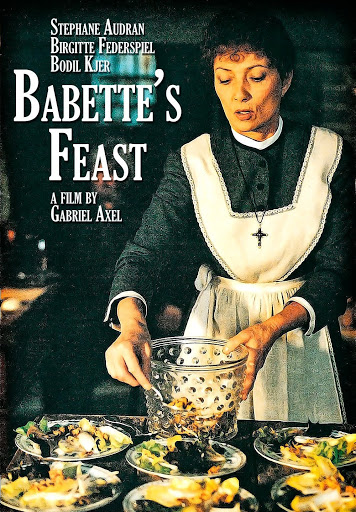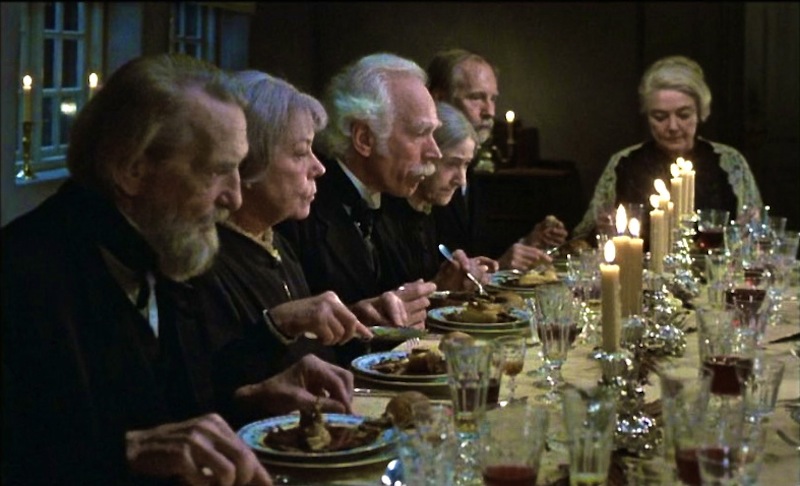Babette’s Feast – About Grace, Glory and Goodness

Some might say Babette’s Feast symbolically begins when Babette plans to make a meal only princes have enjoyed before.
The story, and its subsequent message of grace and glory, truly begins when Babette is received by two middle-aged women with nothing to offer but their home. Babette has nothing to give that they want, and so the relationship grows from this tiny movement of mutual grace.
Babette, an acclaimed chef, needs to hide for political reasons. She is introduced to sisters Martine and Filippa by way of a letter from a mutual friend. As they hire her with no promise of payment, Babette offers to cook for the sisters who know nothing of Babette’s reputation in the kitchen. More than a Stone Soup chicanerist, she has the ability to do much with little. Humbly, she lets the sisters teach her to make potato soup. Esculent in every way a potato soup could be, the meal convinces the sisters they have made the right move.
Based on a story by Isak Dinesen (author of Out of Africa) found in her collection, Anecdotes of Destiny, it is not a story about the cliched sensual delights of food, as found in lesser films such as “Chocolat.” It is about the grace of being humble, of serving, and of enjoying both the simple and grand things of God. Whether making potato soup or quail in vol-au-vents, Babette always is thankful and diligent to do her best.
When Babette wins the lottery, she decides to make a meal as thanks to the town. She orders delicacies unheard of, and asks the community to help prepare the feast. Skepticism dies down as her neighbors sample morsels, and a new life comes to the village. This is where the comparisons to Chocolat begin and end, as Babette’s only desire is to lift the spirits of the town she has been so much blessed by.
The long table of near-gluttonous dining is memorable. It far exceeds any American Thanksgiving dinner cornucopia overflow, yet is as thankful. So much of the movie culminates then, and the movie satisfies the deepest hunger for a tasty conclusion.
Finding a layer by which to appreciate “Babette’s Feast” is just a matter of watching. For Christians, you will find a subtext of understanding simplicity vs displaying gifts from God. For foodies, you will watch a dream meal presented as Julia Child herself never imagined. For cinematography buffs, you will see a French village shot in intimate detail, so as if you could smell the door frame wood after the rain.
Attend to your senses and sensibilities and order up a copy of Babette’s Feast.

Related Articles
Related
I Am Not Christo
A post shared by Christo and Jeanne-Claude a few years ago caught my eye. I've known of his work, as do most artistically-inclined people, for decades, I realize that the late Christo and his equally late wife, Jeanne-Claude, and I have something in common. We both...
Coffee and Books
Coffee and Books: An uncommonly common collective. When you are reading a particular novel, or poetry for that matter, do you choose your coffee accordingly? Should you? If you're looking for the answer, I don't know. Let's explore what we do know. There are different...
Am I An Entertainer?
Driving a long ways a few summers back, I borrowed a very overdue CD from the library. It was a collection of Billy Joel's greatest hits, and included The Entertainer. Joel reconciles his job is not as a poet or anything noble. He is an entertainer. While he may be...
Follow Me
Some of the links on Brockeim.com are affiliate links from which I receive a small commission from sales of certain items. As an Amazon Associate, I earn from qualifying purchases. This pays for coffee and this website. Thank you!
(c) copyright 2025 Brockeim.com
Are we down here? There’s nothing to see. Well, since you are here, “My heart aches, and a drowsy numbness pains.” John Keats wrote that.